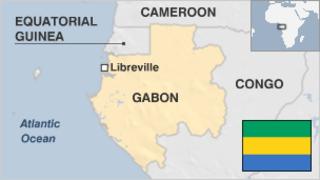Gabon country profile
Gabon, located on the west coast of Africa, has one of the region’s more stable countries.
Since independence from France in 1960, Gabon has had just three presidents. The late President Omar Bongo ruled for more than four decades until his death in 2009.
During Omar Bongo’s rule, Gabon maintained a close relationship with France under a system known as “Francafrique”, receiving both political and military support in exchange for business favours.
But relations have cooled since his son Ali won a contested election in 2009 and the French authorities launched a long-running corruption investigation into the family’s assets.
Gabon is a major oil producer but a third of its population live in poverty, according to the World Bank.
FACTS
The Gabonese Republic
Capital: Libreville
Population 1.5 million
Area 267,667 sq km (103,347 sq miles)
Languages French, Bantu-group languages
Religion Christianity
Life expectancy 62 years (men), 64 years (women)
Currency CFA (Communaute Financiere Africaine) franc
LEADER
President: Ali Ben Bongo Ondimba
Ali Bongo was sworn in for a second seven-year term in September 2016, after Gabon’s constitutional court upheld his narrow victory in a bitterly disputed election.
Main rival Jean Ping described the court’s decision as a “miscarriage of justice” amid opposition claims of vote fraud.
Mr Bongo took over from his late father Omar, who ruled Gabon for 41 years until his death in 2009.
He pledged to address some of the issues that have fuelled anger among the country’s 1.8 million people, like youth unemployment and over-reliance on falling oil revenues
But his presidency has been overshadowed by a long-running French investigation into allegations of embezzlement involving the Bongo family’s assets.
He narrowly won re-election in 2016 in a poll marred by violence and accusations of fraud, and reportedly suffered a stroke in October 2018 that led to concerns about his ability to carry out his duties.
MEDIA
Gabon’s main broadcast media are government-controlled.
Reporters Without Borders says self-censorship is commonplace.
TIMELINE
Some key dates in Gabon’s history:
14th-19th century – European settlers: Arrival of Portuguese slave traders, followed by French, Dutch and British.
1839 – France signs treaties with Gabonese coastal chiefs. Local Mpongwe ruler signs away sovereignty to the French.
1910 – Gabon becomes one of four territories making up French Equatorial Africa.
1958 – Gabon votes to become autonomous republic in the French Community.
1960 – Gabon declares independence.
1967 – Omar Bongo becomes president after the death Leon Mba.
1967-2009 – Omar Bongo dominates Gabonese politics, serving seven consecutive terms.
1990s – Multi-party political system introduced.
2003 – Constitution amended to repeal term limits, ensuring President Bongo holds the presidency for life.
2009 – Death of Omar Bongo, succeeded by his son Ali.
2018 – President Ali Bongo reportedly suffers a stroke, leading to concerns that he will not be able to carry out his duties.
Source: Read Full Article



